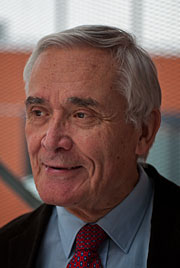Curriculum vitae of Jiří Vácha
Jiří Vácha, born 1938, graduated in medicine and some selected topics in science (biology, physics) in Brno. After some years spent as an intern in several hospitals and clinical fields, he was employed in the Institute of Biophysics, Czechoslovak Academy of Sciences, Brno, for 25 years. He was engaged in experimental research and building of mathematical models in the field of radiation hematology and endocrinology, mainly on the level of the kinetics of cell populations. Paralelly, he was interested in broader problems of radioresistance, "general fitness" and normalcy. (He wrote a monograph "Normality Problem in Biology and Medicine", which was broadly red and cited in Czechoslovakia.) He has been awarded several times the Prize of the Academy for comprehensive collections of papers and The National Prize (with coworkers) in 1990 for research in radiation pathophysiology. In the 80ties a possibility has opened to him to work in various laboratories abroad (Great Britain, Germany, USA, 1 year together). He was appointed a full-time visiting professor at The Johns Hopkins University in Baltimore, Maryland. He finished a postgradual course "Applied logic" at the Faculty of Philosophy, Charles University in Prague and gained his D.Sc. degree in biophysics. He published mainly in the fields of erythropoiesis, internal metabolism of iron, pathophysiological regulations, mechanisms of radioresistance, and of pharmacologic radioprotection.
After the breakdown of the totalitarian regime in November 1989, Dr. Vácha habilitated in Masaryk University, Brno, became full time Professor and Head of the Institute of Pathological Physiology of the Faculty of Medicine. A "Center for Statistics and Mathematical Modelling" has been found by him as a constituent of the Institute. Prof. Vácha lectured on the whole field of pathological physiology with a special emphasis on the genetics of multigenic diseases and has written a pregraduate textbook on pathological physiology. He has been awarded by considerable grant support by the Ministry of Education in 1996 and 2001 and created a research group composed of young scientists and postgradual students, engaged in the molecular pathophysiology of selected "civilization" multigenic diseases. The group attained in the course of time a standard scientific level of research and publication.
Having emerited in 2005, Prof. Vácha intensified his interest and work on evolutionary theory and philosophy and methodology of biology. He has been interested in philosophy since his young days, however, the political conditions were not favourable for a genuine professional philosophical (non-ideological) carrier. Vácha´s original starting point in philosophy was the neoscholasticism in the Christian tradition of his family, later he made himself familiar with basic analytic philosophy, in connection with his stays in English-speaking countries. However, the decisive philosophical influence on him was exerted by Jan Patočka, a direct disciple and follower of Husserl and Heidegger. In the 60s and 70s Vácha had the privilege to become Patočka´s private pupil and gained access to the phenomenological philosophy. Since that time, he has been trying to soften the "hard" scientific approach to medical and biological problems through the prism of phenomenologic methodology. Some reflection of this endeavour could be found already in his monograph on normality and in the textbook of pathophysiology cited below. As emeritus, he devotes himself fully to the philosophical reflexion on the evolutionary biology.
